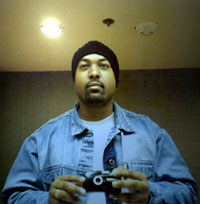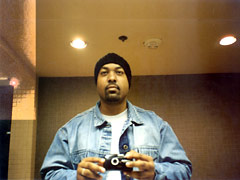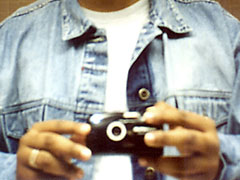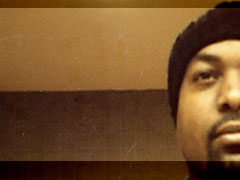The Interview: R.A.S.H.I.D.I
- Music Video/Film Director
- Representing: Cali
- Place of Residence: Englewood, CA
- Current Project: Film/TV Projects
When MTV began airing music videos, day and night, on a 24-365 schedule, they transformed the way music was promoted. Radio was and still is important, but a video is able to deliver an artist’s message and image to exact specifications. The marketing department loves that. However in the channel’s early days, you could stare at the tv screen for hours on end and not once see a single r&b or hip-hop video. Aside from the politics involved, there was a lack of quality videos to put on the air. Record companies would bless rock and roll acts with huge budgets, but when it came time to bankroll a rap project, the budget was closer to the take home pay of a Los Angeles taco stuffer.
In spite of the measly funding, the raw energy inherit in the music cracked through the fuzzy, low budget visuals and sales of rap albums went through the roof. Eventually, the suits delivered video budgets with a few more zeroes, expanding the creative opportunities for music video directors. Inspired by film and hip-hop, some kids sat on the edge of their beds watching these videos, thinking that they would love to get into the field: the bright lights, the glitter, those crazy Spike Lee commercials - a voice in their heads told them that’s where they needed to be.
But how do you get started? According to Rashidi Harper: by any means necessary; as you run into Starbucks, being able to remember how many Mocha Grandes to pick up for the crew; when your sweeping the floor - getting every last ball of lint off the set. Make the extra effort, sweat the small stuff, and while your wiping your forehead, ask someone, “What does that do?”
It’s not about getting in, it’s about what you do once you get in.
Doing the seemingly, menial tasks and paying attention to what was going on gave Rashidi the ability to move on to bigger things - like directing videos for Justin Timberlake of N’Sync and meeting with LA Reid, President of Arista Records, to discuss a project for Donell Jones… oh yeah, and since he’s in the mix, why not change the name on his business cards to R.A.S.H.I.D.I.
I had a chance to talk to this brother about how he got his start. If there is one thing you should take away from the interview it’s that quote to your left. Consider it, the unencrypted key to success.
Your name, R.A.S.H.I.D.I., it’s an acronym. What does it stand for?
R.A.S.H.I.D.I., like, not the acronym, just the name itself, is Arabic. It means enlightened. I made it an acronym more for the visual than for a meaning. There is a meaning, but they are just silly little personal meanings that..
That you make up from day to day?
(laughs) Yeah, ever-changing.
Where did you grow up?
I’m from California, in Los Angeles. I was born in Englewood and just grew up all over L.A., so just being from here I was definitely exposed to the entertainment industry.
I’ve never been to California, but when I visualize Los Angeles, first of all I see Compton. Then, referencing videos, I’ve always pictured Bloods and Crips and Roscoe’s Chicken and Waffles. It’s simple, but that’s my visual of L.A. Is that how Los Angeles really is?
That’s definitely a part of Los Angeles. Those are good things to picture in terms of, you know, most people when they think of L.A. they always think of the beaches and palm trees, and that’s here too. I think for some people of color though, they’re reality is sometimes more the gang thing, and you know hanging out at Roscoe’s or M&M’s - some of the soul food spots - where our culture can get down, know what I mean?
Coming from that environment, how did you get into making videos?
It was a long process, videos just came down the line, but how I got exposed to the entertainment side of it.. I was raised by my mother. She was in school, a junior college out here and was a theatre major. So I spent a lot of time in the theatre watching my mom rehearse for plays; and there were actors and actresses that were having little tv gigs here and there that were in the department she worked with. I think the first play that I actually got involved with was, I believe, A Raisin in the Sun. They had Lorraine Hansbury, who is the writer of that play, she came by and saw one of the performances and they asked me to play a little role in it. That was kind of like when I first stepped out on stage and got that whole feedback. That was the first time when it really, really clicked.
Before I got on stage, I was really impressed with the director who was also the teacher of the theatre class. He was just this older brother, you know.. (laughs) it’s funny cause I say older now, he was probably about my age, who knows how old he was, but umm.. he was doing his thing. I really watched how seriously he took it. I liked how he just seemed to be in control, and the things he did, it worked. The suggestions that he made, made the play just very powerful and emotional.
**note to self** - always make sure that the tape recorder is actually recording.  In this case it wasn’t. So what did you miss? I asked him how old he was when he participated in the play: he said eight years old. Then I jumped a few decades and asked him when was the first time he shot a video? Answer: He was in college and his brother had a little rap group. He did a video for them with a three camera setup on a fixed set - something like those karaoke spots at amusement parks where you lip sync a song and record a video with digitally inserted backgrounds of mountains, skyscrapers, or outer space.
And now, tape rolling.. back to the interview. **end note to self**
.. in college, that was probably the first thing on my own that I did. Then professionally, the first time I shot film, was on a Montell Jordan “Something for the Honeys” video that Hype Williams directed. I had this little bolex camera that I borrowed from a friend of mine and I had my own little crew, and we just went out to this golf course and everybody was there. I shot Red and Meth and Snoop and the Dogg Pound, Coolio.. all these people that showed up. Then it was funny because something happened, some big fight happened, and they wound up kicking us off this golf course (laughs). Unfortunately I didn’t get any of that footage, but those are like the first two things that I actually shot.
Did you go to college to study film?
I was a television broadcasting major for about, maybe a year, but at the same time I had a job at CBS, where I was a page. I worked on a lot of game shows and stuff. I would go there like a few times during the week, and I just really didn’t like going to the same place everyday. So then while I was in school I was like, “I don’t really like that. I don’t like the three camera thing, I’m more into the movie, single camera type directing.” So I dropped television broadcasting as a major and changed my major to liberal studies.
So after that did you get a job working with a production company?
How that happened was, I had a job during the summer working at Warner Brothers Records; basically I had two record label jobs: one year I worked in the mailroom at Polygram when it still was Polygram; and another year I was working at Warner Brothers/Reprise Records, again, in the mailroom. While working at that job this brother was coming in the lobby and said hello. He asked me what I did there, I told him and I asked him what he did. He said he was an assistant director. And I said, “Wow, on music videos? That sounds really cool.” I asked him if he’d invite me down to the set sometime cause I’d like to check it out and possibly do some work. He was like, “Yeah, sure no problem.” We exchanged numbers. Maybe I called him once or twice, just to keep in touch. About three months later he hit me up and asked if I could work that weekend on a project for free. I was like, “Yeah, no problem.”
So I went down, and it was actually a film, a short film, and I was a Production Assistant on that project.
What does a Production Assistant do?
Basically the Production Assistant is like, the person that is the entry level person. It’s their job to do whatever needs to be done, be it to go to Starbucks to pick up coffee for the crew or pick up this lunch from this place. You know, any runs that need to made, that’s pretty much what a Production Assistant does. And then on the set, before the shoot, they’ll pick up the tables and chairs, and maybe pick up some of the other things that are needed for the shoot. And after the shoot they’ll take those things back. So it’s pretty much like every production is only as good as it’s Production Assistants (P.A.‘s), because they really are the backbone, really important.
Is it a well paid position?
Yeah, I mean when you compare it to working at McDonalds or something like that, you know what I’m saying? That’s kinda why I got into it. At the time I was able to make like $125 a day.. $150.. something like that. I thought man that’s incredible, cause at the time it would take me maybe two or three days on a regular job to make $100 and that’s before taxes.
From Production Assistant, what was your next step?
From there I did a lot of jobs, I worked on a gang of videos and met a lot of people. A friend of mine who I met on one of my first jobs was an electrician, but since the time that I had met him he had moved up to be an Assistant Director. He had this job that he was about to do and at the time I was working as a Production Assistant on a movie. That job was almost over but he wanted me to be a second Assistant Director on this music video with him.
At first I turned him down because I was committed to this film and I didn’t want to like leave them hanging and everything. Afterwards I thought about it and I was like, “man this an opportunity to move up, what are you doing?” I called him back and asked if I could still do it and he said yeah. I quit the movie and second AD’d for him.
I was reading your bio and it said that you worked with Hype Williams and a couple of other people, some big names. Was that part of moving on to the Assistant Director thing you were doing?
Yeah, that was the next move I made. At the time, both, myself in Los Angeles, and Hype in New York, used to work for this video director named Lionel Martin. 
I know his name from this local music video show called Video Music Box. It’s hosted by this guy named Ralph McDaniels and Lionel used to be a part of that. He left the show to start a production company.
Yeah, that’s the whole crew that really, I mean they were so instrumental.. if people are really interested in knowing about the history of music videos, especially for us or for people of color, you gotta mention those cats. Pretty much everybody that’s in the game now, in some, way, shape or form worked with those guys. They either worked as a Production Assistant or in different capacities, but.. Lionel Martin was like the king at the time.
So I had been working with him since the time I was a Production Assistant and was kinda beefin with him. I was like, “look man I’m second AD’n for these other companies and I’m still being a P.A. with you. So what’s up?” And he stepped up. He gave me a shot to second AD on a couple of his videos. Then after that he said I want you to assistant direct for this video I got in Los Angeles, and it turned out that the director was Hype. So that’s the first time Hype and I met. And it was the first time I had a chance to assistant direct, before that I was doing second AD jobs. I think it was maybe the third or fourth video that Hype had directed, so we really grew to learn the business as Director and Assistant Director together and really learned a lot about production from you know, from like.. being in the mix, from being right there doing it.
What would you consider your style to be?
I don’t really have a description for my style. I know it sounds vague, but I think my style is just good filmmaking. I mean I’m very, very good at telling a story; I always try to incorporate a story. It’s just the way I think, and it’s not always popular because music videos are about the performance more than anything, but still I try to tell some sort of story some way.
What was the first project you directed?
The first video I directed was for this mc named Aceyalone, who used to be in a group called The Freestyle Fellowship. He still is, but at the time he was doing his solo thing; the video was for a song called “Mic Check.” That was the first project that I directed. My first big project was a Montell Jordan video.
“Something for the Honey’s” ?
No, it was for “Falling,” which was on his second album. That’s why it was ironic because I had just worked on the set for the honey’s video the year before, you know PA’n and like a year later I was the Director. So it was pretty cool.
Who are some of the other artists you’ve worked with?
Wyclef Jean, Snoop Dogg.. Me and Snoop did a short film together.
Which one?
It was called “Corleone’s Revenge,” it was never released though. It just didn’t happen, we got real close but it didn’t happen. Still I learned a lot from the process. I think working with Snoop I learned the value of a star; a star, a celebrity, someone who’s really marketable and big at whatever it is they do, opens a lot of doors for a lot of years - that’s the biggest thing I learned from the process of trying to make a movie. So I worked with Snoop, Missy Elliot, Lil Mo, Jermaine Dupri, Slick Rick, Kid Capri.. a lot of people.
What are your most recent videos?
The most recent thing was a project for a French artist named Vibe. That was something I shot in France, and a Justin Timberlake/ Brian McKnight video for the song “My Kind of Girl.”
In your bio it says that you worked on that new Donell Jones commercial, you did that too right?
Yeah..
Before reading that, I saw the commercial on BET and it caught my eye.. the visuals and everything.
Yeah, we shot that in Brooklyn. It was really great because it’s kind of a groundbreaking project. You will probably start seeing that style more. Not a lot of people have been trying to sell their albums like a product. Usually they’ll just take clips from the video and put a voiceover on top of it and that’ll be your commercial. Arista was kind enough to give us an opportunity to do something different, something better. L.A. Reid really fell in love with it, and the president of MCA actually called him up trying to figure out how they did it and who did it and all of that. So it was kinda cool.
What do you like most about directing videos?
I love music. I have a lot of respect for people that make music. The thing that I love about it the most is being able to help the artist come with a vision for their music. It’s really a privilege to be honest, to be able to share in their creativity. It’s really taking their creativity to another level after they’ve slaved over it in the studio for however long, to get it out. It’s not easy to put records out and it’s not easy to get hits. To be part of the whole process of watching something grow and become a hit or you know, being in the grocery store and somebody singing a song that you worked on. Those are some pretty great things.
What’s the most difficult part of your industry?
The fact that it’s a business, you know? If your an artist - like, I consider myself an artist - it’s difficult to be just a straight up artist and make money at the same time because once money comes into it, then a whole lot of other factors enter into it as well: like politics and who has control of the project. It’s kind of inescapable. It’s not just the music video industry, it’s whatever you do anytime you get paid for your art; politics is gonna be a part of the equation. And I think that like any other industry it’s just very, very competitive and you have to have this incredible focus and this incredible drive and this incredible desire to really be able to succeed in it. Even if you have all of those things it doesn’t mean that your gonna succeed in it, you know, it’s also a matter of timing, and every person has their own path, so it ain’t no telling when it’s gonna break for anybody.
It seems like everybody has a cycle, where they get a whole bunch of work all at once. You see their name popping up and you think they’re new to the game, but they’ve actually been in the industry for a long time.
Every director that you see on tv right now has been in the game for a minute, even though you’ve never seen their name, they’ve all been around struggling and surviving to get to the point where they have the opportunity to direct and live their dream. So yeah, definitely.
What are your future plans?
Right now I’m developing some lifestyle shows for cable television.. digital television.. that are definitely a departure from music videos, but they’re shows that kinda gather up some of my other interests. Then another thing I’m doing is developing some screenplays and looking to direct my first feature film. That’s probably closest to my heart as far as my expression is concerned. The television thing is just something that I think is kinda smart and intelligent and speaks to that side of my personality.
With the film, are you looking to go straight to video, DVD, or are you shooting for the major studios?
I’m definitely shooting for the majors, but to be honest with you, for me, filmmaking is a life long journey. It’s not something that I’m like like, “Okay, I just want to do this until I’m 35 and then I’m gonna blah blah blah.” It’s not really like that with me. So when I look at it like that, it doesn’t really matter where the film comes out. Obviously anything you make you would want people to see it, especially if it turns out good and you like it. But it’s not even about where it comes out, it’s about doing something great that I believe in, you know, and a great story and something that I’m really excited about. That’s what I’m looking for.
For someone trying to get into the industry as a music video director, what would you advise them to do?
To get in you just gotta do whatever you can and get in any kind of entry level position. I think with anything in life that you want to do you can’t, like, want to be the U.S. Postmaster but never work at the Post Office. So it’s like if you think you want to direct music videos, then you should probably try to get a job at production company or at a label. Take an internship. Whatever you have to do to get in that’s what you gotta do.. but it’s not about getting in, it’s about what you do once you get in.
I guess you can’t expect success right away then?
It goes back to that thing I was saying about everyone has a path. For some people it comes quick, for others it takes a long time. I think it’s more about your commitment to whatever it is that your trying to do. If your committed, then as long as it takes you’ll go for it.
That’s real. One more thing. What does it mean to be a member of The Department of Film?
It means that I have the opportunity to be at a young company that is about filmmaking as opposed to just the short term popular music video. They’re committed to doing documentaries, feature films, straight to video or theatrical. They’re just a company that’s young and hungry; ready to make an impact.
For more on R.A.S.H.I.D.I. check out his bio page at The Department of Film
————————
whudat.com - August 2002


